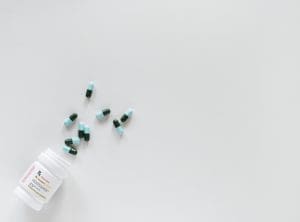There’s No Shame in Taking Antidepressants
 I was about four years into my battle with depression when I began taking Lexapro. I had been in and out of therapy in the preceding years, and each therapist I visited asked if I’d be interested in taking medication if my condition warranted it. I always said yes, but my mother was less enthusiastic about the prospect of me taking antidepressants. “You don’t want to rely on meds,” she would say. “They mess with your mind.” Needless to say, she wasn’t thrilled when I decided to try an antidepressant. She thought they would be a temporary fix that would get me through a rough patch, and then I would wean myself off them. And for a while, I believed this, too.
I was about four years into my battle with depression when I began taking Lexapro. I had been in and out of therapy in the preceding years, and each therapist I visited asked if I’d be interested in taking medication if my condition warranted it. I always said yes, but my mother was less enthusiastic about the prospect of me taking antidepressants. “You don’t want to rely on meds,” she would say. “They mess with your mind.” Needless to say, she wasn’t thrilled when I decided to try an antidepressant. She thought they would be a temporary fix that would get me through a rough patch, and then I would wean myself off them. And for a while, I believed this, too.
After about a year and a half, I began feeling well enough that I decided I didn’t need the Lexapro anymore. My psychiatrist allowed me to decrease my dosage until I was off the medication completely. But then I started college, and my anxiety and depression came back in full force. I ended up taking a semester off to address an eating disorder, and while I was in treatment I decided that I needed to go back on my medication. The academic and social pressures of school took a serious toll on my mental health, and I needed some extra help coping with it. This was the right thing to do, and my symptoms are much more manageable. My mother supports my decision, but she still isn’t the biggest fan of antidepressants. Just last week, I increased my dose of Lexapro, and she wanted to know why I did this. “Isn’t the goal to get yourself off of it?” she said. Right now, my goal is to do whatever I can to ease my depression in a healthy way and fully experience life. If that means that I’m on antidepressants for the rest of my life, then so be it.
My mother’s response to my medication is an example of the stigma surrounding antidepressants. There are many misconceptions about antidepressants, such as that they don’t really do anything, they put people at risk for violent behavior, and that people who take them aren’t trying hard enough to alleviate their condition on their own. But studies that compared antidepressants against a placebo in adults with depression found that  subjects who took the antidepressant saw greater relief than those who took the placebo, proving that medication is an effective way to treat depression. There are biological factors involved in depression, such as neurotransmitter behavior, and medications work to correct these factors. It’s very similar to taking medication for a chronic physical illness – over time, it makes the condition more manageable.
subjects who took the antidepressant saw greater relief than those who took the placebo, proving that medication is an effective way to treat depression. There are biological factors involved in depression, such as neurotransmitter behavior, and medications work to correct these factors. It’s very similar to taking medication for a chronic physical illness – over time, it makes the condition more manageable.
Like all medications, antidepressants come with the possibility of side effects, such as dry mouth, weight gain, and in some rare cases, an increase in suicidal thoughts. Medication isn’t for everyone, and it may take some trial and error to find the right medication and dosage for you. If you decide to try an antidepressant, know that this is perfectly okay – it doesn’t make you weak! It means that you are working to overcome your illness. In Pennsylvania, 14 is the age of consent for mental health treatment, meaning that you don’t need a parent or guardian’s permission to start therapy or medication. Always talk to a mental health professional before starting medication, and take it exactly as prescribed. Taking medication for your mental health is nothing to be ashamed of, and it can be a very important part of recovery!
Do you take medication for mental illnesses? Is it something you feel comfortable talking about with others? What other reasons do you think people have against medication for mental health?




Recent Comments